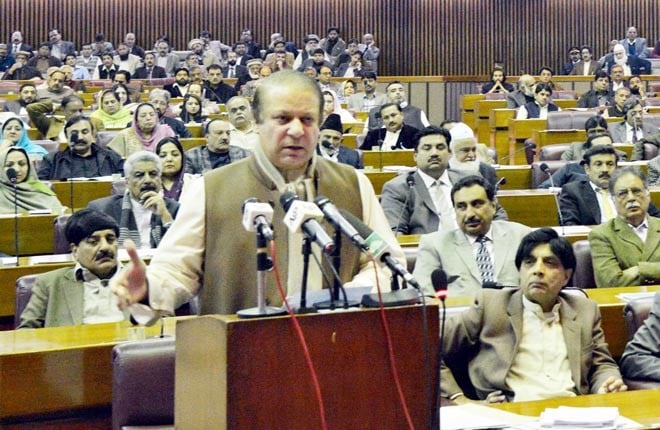

When it comes to springing surprises, the federal government is giving everyone a run for their money. The Prime Minister’s recent speech on the way we will tackle (but not really) the threat of terrorism hit a stumbling block. He sounded like a man about to break off a relationship -- only to turn around and say, "But I will still try to make it work, even though I have no clue how to go about it."
However, I might be guilty of over-simplifying matters. So, let’s try to add some nuance here.
The PM, for all intents and purposes, is the CEO in a democracy such as ours. He has to make difficult decisions and he also has to keep people happy -- especially those who disagree with him. There is a political dimension to this whole affair. He does not want the opposition scoring highly on the public relations front when his government is already mired by so many issues.
Military action in North Waziristan may have some support and some indifference among the general population. But if it leads to more attacks in urban centres then the opposition will put the government on the mat. The PM, of course, knows this so he played politics by sounding tough but also by not giving the opposition another opportunity to attack his government.
But should this solely be about politics? Or should the PM be held to a higher standard, say a higher responsibility to the people?
Unfortunately, it does not work that way in any democracy. So we are better off being realists than idealists.
But despite playing politics, and even if one takes a realist’s view of things, the PM got some things really wrong. His ploy, as it were, might have been to build more support for an eventual military action (if it comes to that). However, by failing to identity any clear targets or outlining what are the ‘non-negotiable’ aspects, he has made his eventual task even more difficult. The PM or anyone else in his position does not need any lofty moral reason to fight the menace of terrorism. The motivation of staying in active power politics should be enough -- and I feel there is nothing wrong with that.
But even from that perspective, this speech leaves the state of Pakistan looking confused and myopic. Worse, it limits future options (and their strengths) for the PM.
To make matters worse, the negotiators that he identified in a much-hyped speech turned around and said they were surprised at being nominated -- a couple also told the nation not to expect much. To say this is not the best start would be the understatement of the past six decades.
Allocation of responsibility and clarity is important in any negotiation. People on negotiating teams need to be clear about what they can promise and deliver. However, there is no political ownership of these latest proposed talks with the TTP. We needed to put politicians on the negotiating team so they could have informed the electorate of what was at stake. Sure, they could have been supplemented by people with ‘links’ to the other side but it was imperative that politicians were seen as giving it a final go. This was also a golden chance for the PM to make the PTI and JUI look silly -- had he constituted a negotiating team with fair representation from these two parties, the public would have seen through the reductionist discourse being perpetrated.
On the one hand, we are passing draconian new laws such as the Protection of Pakistan Ordinance. On the other, we are inviting the terrorists to talk to us so that the state may be saved. The sheer lack of consistency in the thought process will not be lost on the TTP. They can see through the hollowness that we breathe. The state of Pakistan seems to be promising a good punch -- but realising that it cannot throw it right now.
And this brings me to the most depressing aspect of the PM’s speech. The lack of real resolve in his speech is not an indictment of his government. The lack of focus is not his doing alone. It is the state of Pakistan that is too weak to contain this menace at present--and it is coming to grips with this reality.
One option is that we go down fighting and we acknowledge that this is a question of our survival. The other option, the one we are pursuing right now, is that we bide time and look silly and inconsistent -- but we continue to exist. Such an existence, of course, comes at a price. The minds of our youth and the poison in our popular discourse will continue to grow as the state negotiates its existence. By negotiating with the terrorists we concede our weakness -- but we also acknowledge that the battle is half-lost.
A state that continues to exist with an army but is perennially imperiled by the threat of violence is no real state. An offer of negotiation that stems from a realisation that you cannot fight is not really an offer -- it is a concession. Laws that promise strict punishment for militants but are applied only to ethnic separatists are mere instruments of oppression.
A speech that promises a punch but withdraws it then is just talk. And just talk is what the TTP thinks we can do.
This negotiation then is for them to dictate.